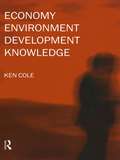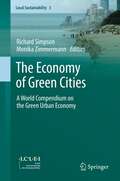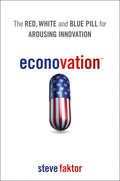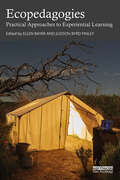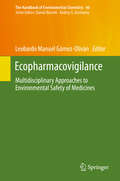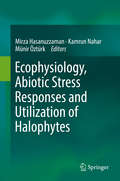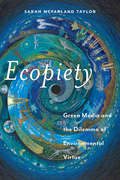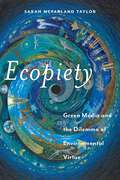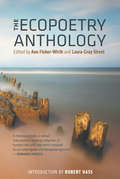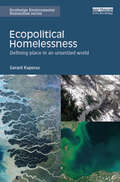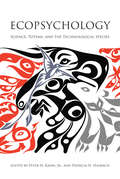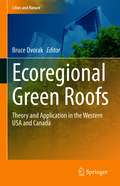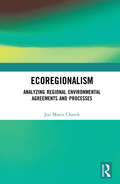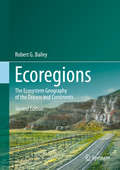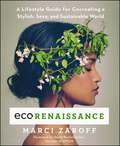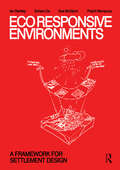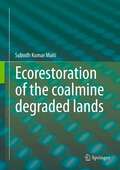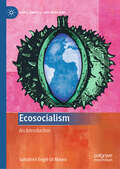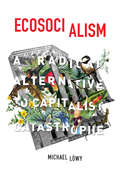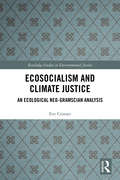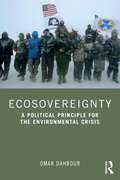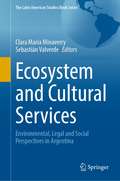- Table View
- List View
Economy-Environment-Development-Knowledge
by Ken ColeAs we approach the end of the second millennium, we find ourselves in times of radical social change. Orthodox explanations of the economy, the environment and the development process are unable to provide coherent policies for such issues as employment creation, environmental degradation and social progress.Economy-Environment-Development-Knowledge provides alternative perspectives on these fundamental aspects of human existence. Economists, environmentalists, and development theorists have so far been unable to agree on the most successful prescriptions to address problems. To understand, contrast and compare alternative understandings of economic, environmental and development issues, we need to be aware why theorists conceptualise the process of social experience so differently.Part 1 of Economy-Environment-Development-Knowledge addresses the subjective preference, cost-of-production and abstract labour theories of values in economics; Part 2 explains egocentrism, ecocentrism and socioecocentrism as competing theoretical perspectives in environmental theory; Part 3 highlights modernisation theory, structuralist theory and class struggle as ways to account for the process of development and Part 4 examines the generation of knowedge through positivism, paradigms and praxis, legitimating competing perspectives in economics, environmentalist and development. The book concludes by considering why different people find alternative explanations more or less plausible.By addressing the disagreements between theorists, Economy-Environment-Development-Knowledge provides a unique basis to contrast and compare the plethora of theories of, and policies for, economic prosperity, environmental sustainability and social progress.
The Economy of Green Cities: A World Compendium on the Green Urban Economy
by Monika Zimmermann Richard SimpsonThis volume bridges the gap between the global promotion of the Green Economy and the manifestation of this new development strategy at the urban level. Green cities are an imperative solution, not only in meeting global environmental challenges but also in helping to ensure socio-economic prosperity at the local level.
Econophysics and Companies: Statistical Life and Death in Complex Business Networks
by Hideaki Aoyama Yoshi Fujiwara Yuichi Ikeda Hiroshi Iyetomi Wataru SoumaEconophysics is an emerging interdisciplinary field that takes advantage of the concepts and methods of statistical physics to analyse economic phenomena. This book expands the explanatory scope of econophysics to the real economy by using methods from statistical physics to analyse the success and failure of companies. Using large data sets of companies and income-earners in Japan and Europe, a distinguished team of researchers show how these methods allow us to analyse companies, from huge corporations to small firms, as heterogeneous agents interacting at multiple layers of complex networks. They then show how successful this approach is in explaining a wide range of recent findings relating to the dynamics of companies. With mathematics kept to a minimum, the book is not only a lively introduction to the field of econophysics but also provides fresh insights into company behaviour.
Econophysics of Income and Wealth Distributions
by Arnab Chatterjee Satya R. Chakravarty Anirban Chakraborti Bikas K. ChakrabartiThe distribution of wealth and income is never uniform, and philosophers and economists have tried for years to understand the reasons and formulate remedies for such inequalities. This book introduces the elegant and intriguing kinetic exchange models that physicists have developed to tackle these issues. This is the first monograph in econophysics focussed on the analyses and modelling of these distributions, and is ideal for physicists and economists. It is written in simple, lucid language, with plenty of illustrations and in-depth analyses, making it suitable for researchers new to this field as well as specialized readers. It explores the origin of economic inequality and examines the scientific steps that can be taken to reduce this inequality in the future.
Econovation: The Red, White, and Blue Pill for Arousing Innovation
by Steve FaktorOver the last 20 years, China fed our zombie-like appetite for iPhones, Prada and Snuggies. At the same time, its biggest customer, the US, found itself in debt, under-educated, and covered with recreational tattoos. So now what? Will America wallow in mediocrity like Greece or some C-list celebrity? Or, will our legendary ingenuity save us from Tweeting...and eating our way to irrelevance? Econovation is a bold, witty response to those questions that doesn't rely on miracles or government for answers. It challenges business leaders to think differently about the next decade of the US economy and respond with big, sustainable innovations. Written by Steve Faktor, former Vice President of Growth & Innovation and head of the Chairman's Innovation Fund at American Express, Econovation is a trends book on steroids. It's bursting with practical, thought-provoking ideas no executive, entrepreneur or Fed Chairman can afford to miss. Most importantly, Econovation envisions a very different future. It's one ruled by "producerism", not consumerism. It's a future in which real innovators must do more than slide a greasy finger over the screen of an iPad. Econovation uncovers opportunities in unexpected places. You'll learn how to: Capitalize on a market that will go from making nothing to making everything...for China. Use psychological pricing and some crafty tricks from Google to reduce reliance on tapped-out consumers Sell to consumers whose new identities will be based on what they create, not what they buy, click or super-size Seduce a desperate government to finance your business, then feed you pancakes in the morning Motivate tomorrow's employee with social currency instead of the green, depreciating kind Upgrade your business and your kids with a little help from Mormons and kindergartners with hacksaws Econovation is a fresh perspective on a future we've taken for granted. It empowers readers to think big, dream big, and conquer economic conditions that will paralyze others. With a hefty dose of data, humor, and actionable ideas, Econovation offers insight and amusement in one, convenient place - a rare treat for a business book.
Ecopedagogies: Practical Approaches to Experiential Learning
by Ellen Bayer Judson Byrd FinleyEcopedagogies showcases a range of creative approaches that educators across multiple disciplines use to empower students to access and engage with nature, an increasingly important consideration in a post-COVID world in environmental crisis. The volume includes chapters written by scholars from the environmental arts and humanities, literature, writing studies, rhetoric, music, religious studies, environmental studies and sustainability, sociology and anthropology, physical education, and outdoor education. Each author walks the reader through the details of how their ecopedagogy works, identifies potential challenges while also detailing how to address them, and explains the rewards to students, instructors, and more-than-human nature that they have witnessed through the use of these approaches. The contributions represent diverse types of academic institutions, offering broad applicability to instructors, including community colleges, private liberal arts colleges, and large state, regional, public, and private universities. The book explores a series of key questions about how educators can facilitate meaningful learning experiences with the natural world, inside and outside the classroom, and it looks at how to foster inclusivity, navigate problems with access, and explore intersections with environmental justice. As a practical guide, the book delivers a well-provisioned toolbox containing exercises, activity guides, and assignments for those teaching environmentally focused college courses.
Ecopharmacovigilance
by Leobardo Manuel Gómez-OlivánThe indiscriminate use of medications and their inadequate disposal have resulted in them being released into the environment via municipal, hospital and industrial discharges. This volume critically examines the presence of pharmaceuticals in aquatic ecosystems, the hazards they entail, and how to minimize their impact on the environment. The topics covered include: historical findings that have made the development of the discipline ecopharmacovigilance possible; the main exposure routes, fate and life cycle of pharmaceuticals in water; occurrence data and the impact on biodiversity; methods used for the detection, analysis and quantification of pharmaceuticals in water and for their removal; current legislation on the presence of emerging contaminants in water; biosensors for environmental analysis and monitoring; and the measures needed to reduce the existing problems. This book is aimed at students, academics and research workers in the fields of toxicology, ecology, microbiology and chemistry, as well as those in the pharmaceutical industry, health sector professionals, and members of government bodies involved in environmental protection and legislation.
Ecophysiology, Abiotic Stress Responses and Utilization of Halophytes
by Münir Öztürk Mirza Hasanuzzaman Kamrun NaharHalophytes are those plant species that can tolerate high salt concentrations. There are diversified species of halophytes suited for growth in various saline regions around the world, e.g. coastal saline soil, soils of mangrove forests, wetlands, marshlands, lands of arid and semiarid regions, and agricultural fields. These plants can be grown in soil and water containing high salt concentrations and unsuitable for conventional crops, and can be good sources of food, fuel, fodder, fiber, essential oils, and medicine. Moreover, halophytes can be exploited as significant and major plant species for the desalination and restoration of saline soils, as well as phytoremediation. This book highlights recent advances in exploring the unique features of halophytes and their potential uses in our changing environment.
Ecopiety: Green Media and the Dilemma of Environmental Virtue (Religion and Social Transformation #1)
by Sarah McFarland TaylorTackles a human problem we all share―the fate of the earth and our role in its future Confident that your personal good deeds of environmental virtue will save the earth? The stories we encounter about the environment in popular culture too often promote an imagined moral economy, assuring us that tiny acts of voluntary personal piety, such as recycling a coffee cup, or purchasing green consumer items, can offset our destructive habits. No need to make any fundamental structural changes. The trick is simply for the consumer to buy the right things and shop our way to a greener future.It’s time for a reality check. Ecopiety offers an absorbing examination of the intersections of environmental sensibilities, contemporary expressions of piety and devotion, and American popular culture. Ranging from portrayals of environmental sin and virtue such as the eco-pious depiction of Christian Grey in Fifty Shades of Grey, to the green capitalism found in the world of mobile-device “carbon sin-tracking” software applications, to the socially conscious vegetarian vampires in True Blood, the volume illuminates the work pop culture performs as both a mirror and an engine for the greening of American spiritual and ethical commitments. Taylor makes the case that it is not through a framework of grim duty or obligation, but through one of play and delight, that we may move environmental ideals into substantive action.
Ecopiety: Green Media and the Dilemma of Environmental Virtue (Religion and Social Transformation #1)
by Sarah McFarland TaylorTackles a human problem we all share―the fate of the earth and our role in its future Confident that your personal good deeds of environmental virtue will save the earth? The stories we encounter about the environment in popular culture too often promote an imagined moral economy, assuring us that tiny acts of voluntary personal piety, such as recycling a coffee cup, or purchasing green consumer items, can offset our destructive habits. No need to make any fundamental structural changes. The trick is simply for the consumer to buy the right things and shop our way to a greener future.It’s time for a reality check. Ecopiety offers an absorbing examination of the intersections of environmental sensibilities, contemporary expressions of piety and devotion, and American popular culture. Ranging from portrayals of environmental sin and virtue such as the eco-pious depiction of Christian Grey in Fifty Shades of Grey, to the green capitalism found in the world of mobile-device “carbon sin-tracking” software applications, to the socially conscious vegetarian vampires in True Blood, the volume illuminates the work pop culture performs as both a mirror and an engine for the greening of American spiritual and ethical commitments. Taylor makes the case that it is not through a framework of grim duty or obligation, but through one of play and delight, that we may move environmental ideals into substantive action.
The Ecopoetry Anthology
by Robert Hass Laura-Gray Street Ann Fisher-WirthDefinitive and daring, The Ecopoetry Anthology is the authoritative collection of contemporary American poetry about nature and the environment--in all its glory and challenge. From praise to lament, the work covers the range of human response to an increasingly complex and often disturbing natural world and inquires of our human place in a vastness beyond the human.To establish the antecedents of today's writing,The Ecopoetry Anthology presents a historical section that includes poetry written from roughly the mid-nineteenth to the mid-twentieth century. Iconic American poets like Walt Whitman and Emily Dickinson are followed by more modern poets like Wallace Stevens, William Carlos Williams, Ezra Pound, and even more recent foundational work by poets like Theodore Roethke, Elizabeth Bishop, Robert Hayden, and Muriel Rukeyser. With subtle discernment, the editors portray our country's rich heritage and dramatic range of writing about the natural world around us.
Ecopolitical Homelessness: Defining place in an unsettled world (Routledge Environmental Humanities)
by Gerard KuperusWhile our world is characterized by mobility, global interactions, and increasing knowledge, we are facing serious challenges regarding the knowledge of the places around us. We understand and navigate our surroundings by relying on advanced technologies. Yet, a truly knowledgeable relationship to the places where we live and visit is lacking. This book proposes that we are utterly lost and that the loss of a sense of place has contributed to different crises, such as the environmental crisis, the immigration crisis, and poverty. With a rising number of environmental, political, and economic displacements the topic of place becomes more and more relevant and philosophy has to take up this topic in more serious ways than it has done so far. To counteract this problem, the book provides suggestions for how to think differently, both about ourselves, our relationship to other people, and to the places around us. It ends with a suggestion of how to understand ourselves in an eco-political community, one of humans and other living beings as well as inanimate objects. This book will be of great interest to researchers and students of environmental ethics and philosophy as well as those interested in the environmental humanities more generally.
Ecopopulism: Toxic Waste and the Movement for Environmental Justice
by Andrew SzaszThis book reconstructs the growth of a powerful movement around the question of toxic waste, following the issue as it moves from the world of "official" policymaking in Washington, onto the nation's television screens and into popular consciousness, and then into America's neighborhoods, spurring the formation of thousands of local, community-based groups.
Ecopsychology: Science, Totems, and the Technological Species
by Jr. Peter H. Kahn Patricia H. HasbachAn ecopsychology that integrates our totemic selves—our kinship with a more than human world—with our technological selves.We need nature for our physical and psychological well-being. Our actions reflect this when we turn to beloved pets for companionship, vacation in spots of natural splendor, or spend hours working in the garden. Yet we are also a technological species and have been since we fashioned tools out of stone. Thus one of this century's central challenges is to embrace our kinship with a more-than-human world—"our totemic self"—and integrate that kinship with our scientific culture and technological selves.This book takes on that challenge and proposes a reenvisioned ecopsychology. Contributors consider such topics as the innate tendency for people to bond with local place; a meaningful nature language; the epidemiological evidence for the health benefits of nature interaction; the theory and practice of ecotherapy; Gaia theory; ecovillages; the neuroscience of perceiving natural beauty; and sacred geography. Taken together, the essays offer a vision for human flourishing and for a more grounded and realistic environmental psychology.
Ecoregional Green Roofs: Theory and Application in the Western USA and Canada (Cities and Nature)
by Bruce DvorakThis book studies the application of green roofs in ecoregions of the western United States and Canada. While green roofs were intended to sustain local or regional vegetation, this volume describes how green roofs in their modern form are typically planted with a low-diversity mix of sedums from Europe or Asia. The authors demonstrate how in the western USA and Canada many green roofs have been designed with native plants and have been found to thrive.Part I of this book covers theory and an overview of ecoregions and their implications for green roofs. In Part II vegetation from prairies, deserts, montane meadows, coastal meadows, and scrub and sub-alpine habitats are explored on seventy-three ecoregional green roofs. Case studies explore design concepts, materials, watering and maintenance, wildlife, plant species, and lessons learned. Part III covers an overview of ecoregional green roofs and a future outlook.This book is aimed at professionals, designers, researchers, students and educators with an interest in green roofs and the preservation of biodiversity.
Ecoregionalism: Analyzing Regional Environmental Agreements and Processes
by Jon Marco ChurchThis book provides a comprehensive understanding of environmental regionalism at the international level, analyzing the concept and identifying recurring patterns from six in-depth case studies. While ecoregions or environmental regions are defined on ecological boundaries rather than administrative criteria, ecoregionalism is the idea that regional dynamics should cluster around ecoregions, while ecoregionalization is the tendency of regional dynamics to cluster around ecoregions. Focusing on the international level, this book presents six cases of ecoregional processes from around the world and the regional environmental agreements: two are terrestrial, the Alps and the Andes; two are marine, the Mediterranean Sea and the Baltic Sea; two are related to freshwater ecosystems: the Amu Darya in Central Asia and the Great Lakes in North America. The book analyzes both ecoregional processes focused on the environment, as well as intersectoral ecoregional processes. The case studies are analyzed based on the ecoregional governance framework, developed by the author for this book. Despite the diversity of context, the similarity of the governance system of the six cases is striking. Several recurring patterns have been identified, which may also extend to the subnational level. They are not design principles, but may be taken into consideration for the design or redesign of current and future regional environmental agreements and processes. This book will be of great interest to students and scholars of environmental politics, natural resource management, spatial planning and international relations.
Ecoregions
by Robert G. BaileyGlobal warming and human-driven impacts are changing the World's ecological zones. This book applies the principles described in Bailey's Ecosystem Geography: From Ecoregions to Sites, 2nd ed. (Springer 2009, 1st ed. 1996) to describe and characterize the major terrestrial and aquatic ecological zones of the Earth. Bailey's system for classifying these zones has been adopted by major organizations such as the U. S. Forest Service and The Nature Conservancy and this book is a significant contribution to a long tradition of classifying and studying the world's ecological regions or ecoregions. It includes two color maps that show the major ecoregions of the continents and oceans. Also included are: - 106 illustrations with 55 in full color - A new chapter on mountains is included. - There are new sections that address concerns about how eco regions are changing under the relentless influence of humans and climate change - Another new feature is the discussion of using eco regional patterns to transfer research results and select sites for detecting climate change effects on ecosystem distribution - Use of ecoregional patterns to design monitoring networks and sustainable landscapes - Fire regimes in different regional ecosystems and their management implications.
ECOrenaissance: A Lifestyle Guide for Cocreating a Stylish, Sexy, and Sustainable World
by Horst Rechelbacher Marci ZaroffECOrenaissance provides inspiring tips and tricks for how to live and shop in harmony with nature without sacrificing style or luxury, and how best to benefit from the current renaissance—a global rebirth of sustainable economics, progressive ethics, and green culture—through the wisdom of eco-entrepreneurs, green fashion designers, organic food purveyors, and innovative leaders of this new movement.Gone are the days of boxy hemp shirts and gritty granola—cutting-edge innovation has made ecology as stylish and sexy as red carpet fashion, and everyday people are leading the charge with the choices they make in grocery stores, car lots, at work, in schools, and in their homes. In ECOrenaissance, renowned visionary Marci Zaroff provides a comprehensive guide to help you embrace sustainable living as both a celebration of style and a necessary strategy for maintaining our everyday comforts despite increasingly limited resources. From global warming to drought, genetically modified foods to harmful chemicals in our beauty products, for too long commerce has ignored the health of our planet and our bodies. But now a new age is dawning: one that is uplifting, gorgeous, and accessible. With roundtable discussions from inspiring leaders of the green movement, ECOrenaissance offers you eye-opening and groundbreaking resources to transform your life through supporting companies making significant, practical ecological change. By shining a light on leaders of sustainability throughout the world, Zaroff will transform your understanding of eco-minded products and open new possibilities for you to make a positive impact. Equipped with these tools, you will find new, empowering ways to make “green” elegant in your life, prioritizing current global needs without sacrificing comfort.
EcoResponsive Environments: A Framework for Settlement Design
by Ian Bentley Soham De Sue McGlynn Prachi RampuriaEcoResponsive Environments integrates our current knowledge of designing for human needs, with a deeper understanding of natural systems. The book offers both a call to action and a comprehensive yet pragmatic framework for practising the art and science of settlement design, called EcoResponsive Design.Bridging the gap between theory and generic policy on the one hand, and design for specific places and sites on the other, the book is aimed not only at the professionals involved in planning, designing and developing these places, but also the wider range of communities interested in creating better spaces for our everyday lives.EcoResponsive Design encompasses all scales, ranging from the overall form of settlements and the landscapes in which they sit, to buildings and the detailed design of public spaces. Drawing from projects, places and best practices in many different countries and contexts across the world, it demonstrates how positive changes at the local scale can be achieved for every single site, large or small. The book urges a shift in focus from individual specialisms to collaborative actions, enabling development stakeholders to negotiate a balance between short-term financial viability and longer-term environmental and social values.
Ecorestoration of the coalmine degraded lands
by Subodh Kumar MaitiThe book adopts an application-oriented approach for ecorestoration of coalmine degraded. The theoretical aspects of ecorestoration, and steps involved in ecorestoration process and experimental aspects of thorough analytical procedures have been discussed in detail. It emphasizes on the types of mining, land degradation, and biodiversity conservation while giving details of technical and biological steps, topsoil management, selection of plant species, seeding, nursery practices; adoption of innovative approaches like mulching, biofertlizer application, hydroseeding, superabsorbent; use of grass-legume mix; monitoring and aftercare of reclaimed sites; the indicators of sustainable ecorestoration; and Rules and Acts implemented and followed across the world. Best ecorestoration practices, mine closure issues, collection, laboratory analysis and interpretation of minesoil and topsoil samples, monitoring biological parameters, litterfall and tree growth analysis, erosion management, design of drainage and sedimentation retention basin, and brief description of tree species with identifying character for field people are all part of the book. [Message by Prominent Academician] It is now urgent that methods of coal mining be integrated with engineering for ecorestoration because the larger society will not accept devastated waste land. A book, coming out from the hands of one of the persistent researchers of the field, cannot be more timely. Jayanta Bhattacharya, PhD FNAE Professor, Department of Mining Engineering Indian Institute of Technology, Kharagpur-721302, India.
Ecosocialism: An Introduction (Marx, Engels, and Marxisms)
by Salvatore Engel-Di MauroThis book offers an extensive critical overview of eco-socialism, one of the most generative and significant aspects of contemporary debates within socialism. Marxism has played a foundational role in the development of ecosocialism since its inception and has also led to critical reflections on the 20th century Marxism and ecological interpretation of Marxist writings. Despite the relevance of ecosocialism to the pressing debates on the ecological crisis and the growing literature on ecosocialism, there has not been a comprehensive account on ecosocialism and its variations. This volume seeks to fill this important gap and to pave the way for a more systematic development of this emerging paradigm. The book not only engages with a critique of other non-socialist ecological schools of thought in defence of ecosocialism, but also provides a critical overview of debates within ecosocialism and of ecosocialism itself. The latter includes an appraisal of ecosocialism in Bolivarian Venezuela and the implications of current efforts in the People's Republic of China to build an ecological civilisation. Furthermore, the book contains a crucial discussion about the relation between eco-socialism and indigenous studies and movements.
Ecosocialism
by Michael LöwyCapitalism is killing the planet, and the preservation of a natural environment favorable to human life requires a radical alternative. In this new collection of essays, long time revolutionary and environmental activist Michael Löwy offers a vision of ecosocialist transformation. This vision combines an understanding of the destructive logic of the capitalist system with an appreciation for ongoing struggles, particularly in Latin America.
Ecosocialism and Climate Justice: An Ecological Neo-Gramscian Analysis (Routledge Studies in Environmental Justice)
by Eve CroeserThis book investigates the broader climate movement to contextualise the role played by its climate justice wing, focusing specifically on the theoretical and practical contributions of ecosocialists. Ecosocialism and Climate Justice provides an account of the shift from the Holocene to the Anthropocene in the context of the global spread of capitalist relations of production. Croeser begins by critically analysing the root causes of anthropogenic climate change and identifies the origins and development of the current climate movement within civil society. She then focuses on the climate justice movement, analysing the ways in which anthropogenic global warming may be challenged in a way that is socially just. Overall, this book provides further insight into the effectiveness of ecosocialist theory and activism in the context of existing global, national and local power relationships. This book will be of great interest to students and scholars of climate justice, climate politics, critical global political economy studies and environmental activism.
Ecosovereignty: A Political Principle for the Environmental Crisis
by Omar DahbourIn this book, Omar Dahbour develops the idea of ecosystem sovereignty, calling for a reinterpretation of some essential concepts in political philosophy, including territoriality, self-determination, peoplehood, and sovereignty, in order to make the case for peoples’ rights to protect and maintain their natural environments. In doing so, he theorizes current and historical struggles against resource extractions and land grabs, especially by food sovereignty and indigenous rights movements.The basic idea of ecosovereignty is that peoples living in relation to particular ecosystems have a collective right to ultimate authority over those systems and the resources they contain—provided they manage them sustainably. Dahbour argues that this authority has a legitimacy that overrides that of larger states, at least with regard to matters of environmental management. Ecosovereignty claims may strengthen challenges by peoples to states and corporations seeking to control and transform lands and waters for development, against the wishes of their inhabitants. Dahbour hopes the idea will provide a powerful tool for halting extractivism and ecocide, along with the extreme violence that these processes use against farming, indigenous peoples, and nature.Connecting political and environmental philosophy in an innovative way, Ecosovereignty: A Political Principle for the Environmental Crisis will keep scholars and students informed about an increasingly important topic.
Ecosystem and Cultural Services: Environmental, Legal and Social Perspectives in Argentina (The Latin American Studies Book Series)
by Clara María Minaverry Sebastián ValverdeThis book describes cases and experiences in connection with environmental and cultural ecosystem services in Argentina. It contributes to the debate in connection with different approaches to analyse ecosystem services, focusing on the environment, the Law and social perspectives and concerns. Among the topics discussed are the implementation of the National Forests Act, the regulation and recognition of ecosystem services, the role of indigenous people, the policies in place for nature and forest conservation in different regions of Argentina. This book is one of the few research studies about cultural ecosystem services developed in Latin America and presents an attractive combination of the legal, environmental and social approaches and was written by an interdisciplinary team of academics who have theoretical and practical experience in this region where there is a valuable natural and cultural heritage.
